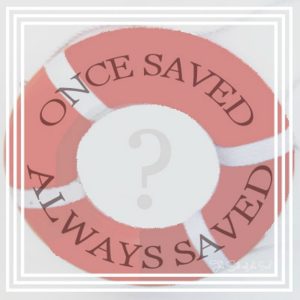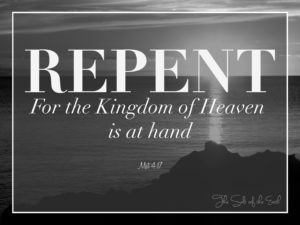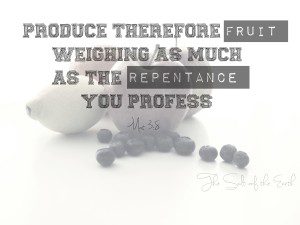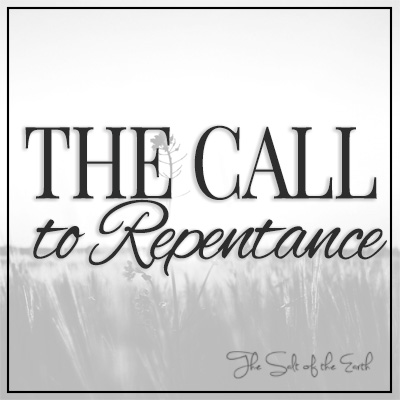The regenerated life of a Christian begins with repentance. Repentance is the first step after hearing the word of God and believing in Jesus Christ (神の子) and His blood. Without repentance you cannot become born again in Christ. But what is repentance according to the Bible and what does repentance mean for a person’s life? Because there are many Christians, who say they believe in Jesus Christ and have repented and are born again, while their lives remain unchanged. They confess Jesus Christ as their Savior and Lord, meanwhile they live the same lives as they lived before their repentance. But if a person doesn’t change and persevere in sin, has the person truly repented? If so, what did the person repent from?
悔い改めとは何ですか?
What is repentance in the Bible? Repentance is a short process and not a lifelong proces. It’s a change of mind and a turning away from the live you lived. In order to understand the process of repentance, we must look at what the Bible says about repentance instead of what theologians, preachers, doctrines of man, and findings and opinions of believers say about repentance. What happens when someone repents?
What does the word repentance mean?
What does the word repentance mean? The word repentance is translated, from the Greek word 「metanoéõ’, and means to think differently or afterward, つまり. reconsider (morally, feel compunction):—repent.
What does the Bible say in the Old Testament about repentance?
Therefore say unto the house of Israel, 主なる神はこう言われる; 悔い改める, and turn yourselves from your idols; and turn away your faces from all your abominations (エゼキエル 14:6)
In the Old Testament, we read many times about God’s call to repentance. The people of God often went their own way, instead of God’s way. They tried to keep God’s law, but they also adapted the Gentile’s culture, 関税, and conduct. Their heart was not totally committed to God. They didn’t love God with all of their heart. Their heart was divided. A part of their heart was devoted to God’s law and precepts, and the other part was devoted to the will, lusts and desires of their flesh and the desire to be and to walk as the Gentiles.
何度も, God spoke through the prophets to His people to reveal and confront them with their trespasses. God revealed the heart of His people to the prophets and showed them the state of His people.
The prophets confronted the people with their sinful behaviour. The people had a choice to take the word of the Lord seriously and repent and to remove the sins,, idols, and all the abominations from their lives and return and submit to God or not.
All God wanted was to have a relationship with His people. God didn’t want to make their lives miserable. But God didn’t want to lose any of His children. He didn’t want any of His children to be lost forever. したがって, out of His great love, God called His people to repentance.
But His people were often stubborn and didn’t want to listen to Him. They thought it would be sufficient to keep the rituals and sacrifices, which God had given to Moses. But God wasn’t interested in their sacrifices for their sins, but their obedience to His will.
They wanted to live their own lives; doing what they wanted to do. They confessed, that they followed and obeyed the commandments of the Lord God. But their heart didn’t belong to God. They lived just like the pagans lived. There was hardly any difference between God’s people and the pagan nations.
But throughout the Old Testament, we read about God’s love and the forgiveness He provided to His people. Every time, God gave the ability to His people to repent of their walk; their way of living, and return to Him.
God didn’t say: 「And now I’ve had it with all of you! You cannot repent anymore, I won’t forgive you anymore!」 いいえ, every time God called His people to repentance. But it was up to the people, what they decided to do: to give heed to His call and repent and remove the sins and iniquities from their lives and submit to God and His Law or to reject His call and keep walking in sins and iniquities.
What does the Bible say about repentance in the New Testament?
The first person in the New Testament, who was sent, to call God’s people to repentance was John the Baptist. During John’s circumcision, on the eighth day, his father Zacharias was filled with the Holy Ghost, and spoke the following words:
And thou, child, shalt be called the prophet of the Highest: for thou shalt go before the face of the Lord to prepare his ways; To give knowledge of salvation unto his people by the remission of their sins, Through the tender mercy of our God; whereby the dayspring from on high hath visited us, to give light to them that sit in darkness and in the shadow of death (ルーク 1:76-79)
God had separated John the Baptist, for a special mission, and secluded John in the wilderness.

John the Baptist didn’t grow up in ‘the world’ among the people. But John the Baptist grew up in the deserts and waxed strong in spirit. He grew up with the pure Word of God and knew the Kingdom of God.
John the Baptist was not affected and defiled by the world system; by religion, 意見, 所見, doctrines and philosophies of people.
When John the Baptist was about 29/30 years old, the word of God came to him.
When the word of God came to him, John the Baptist began to preach the call to repentance and the baptism of repentance for the remission of sin. など, John the Baptist went and prepared the way of the Lord.
The voice of one crying in the wilderness, Prepare ye the way of the Lord, make his paths straight. Every valley shall be filled, and every mountain and hill shall be brought low; and the crooked shall be made straight, and the rough ways shall be made smooth; And all flesh shall see the salvation of God (ルーク 3:4-6)
Repent ye, for the Kingdom of heaven is at hand
John the Baptist began to preach in the whole country of Jordan. He was making a public proclamation, with that formality, gravity, and authority, that people were drawn to his speech and they had to obey his words.
John the Baptist didn’t speak gentle and kind words in order to please the people and speak what the people wanted to hear. But John the Baptist spoke the true words of God, to please God.
Through his message and the baptism of repentance, John gave God’s people the opportunity to repent, to have a change of mind, and to turn away from sins, by removing the sins from their lives. (こちらもお読みください: ‘John the Baptist, the man who didn’t bow「).
The baptism of John was in view of the fact, that sins were put away. While John baptized the people in the Jordan river, the people confessed their sins and were immersed in the water.
What is the fruit of repentance?
How did John the Baptist know that the people had not repented? By the fruit of their walk; 彼らの作品. The fruit of their walk was not weighing as much as the repentance they professed. In other words, their works didn’t correspond with what they were saying.
Repentance means, having a change of mind relative to the previous life. It means a change of mind regarding your former life, which result in sorrow, regret, and a change of conduct, especially morally, and the putting away of sins.
Bring forth therefore fruits worthy of repentance (ルーク 3:8)
What did Jesus say about repentance?
When Jesus came out of the wilderness, He began to preach, 言ってる, “悔い改める, because the Kingdom of God has come near.” Jesus preached the same message as John the Baptist. He carried the same message of repentance. Just like John, Jesus spoke with a formality, gravity, and authority, that people were drawn to His speech and had to obey His words.
Jesus didn’t preach what the people wanted to hear, nor did Jesus preach messages to please and to win the people and gain more followers. But Jesus preached the truth, which often contained hard words. Because the words of Jesus were hard, almost all His disciples turned away from Him and left Jesus, except the twelve (ジョン 6:60-69).
Jesus began to upbraid the cities of Bethsaida, Chorazin, and Capernaum, where Jesus performed most of His miracles; the demonstrations of the power of God, but they didn’t repent.
Therefore Jesus said, that on the Day of Judgment, it would be more endurable for the cities of Tyre, Sidon, and Sodom, than it would be for them. イエスは言いました。, they would descend to hell; the depths of misery and disgrace in the unseen world (マシュー 11:20-23).
Didn’t they believe in Jesus? They saw the miracles and powers of the Kingdom of God, so they did believe, but… they didn’t repent.
いいえ, they didn’t turn away from their sins and their lives as sinners. They loved their lives. したがって, they couldn’t remove the sins from their lives, because they loved doing what they did. They couldn’t give up their own lives and die to ‘self’. That’s why they didn’t repent.
イエスは言いました。, that unless people repent, they will all perish (ルーク 13:5)
What did Jesus say about repentance after His resurrection?
Maybe you think, "はい, but that was before the crucifixion and resurrection of Jesus Christ. 今, we have forgiveness of all our sins, by the blood of Jesus. 今, we live under grace.”
Really? 黙示録では, Jesus still spoke the same words and the same message about repentance and putting away sin.
悔い改める; さもなければ、私はすぐにあなたのところに行くでしょう, and will fight against them with the sword of my mouth (暴露 2:16 KJVの)
したがって, have a change of mind at once. But if you do not, I am coming to you quickly and will war against them with the sword of my mouth. (暴露 2:16 KWT)
Jesus spoke these words after His crucifixion, 彼の復活, そして His ascension to heaven.
したがって, 人々, who persevere in sin and are don’t remove the sins from their lives are not saved. No matter what people, who call themselves Christians say or think. Their works will be judged by the Word on the Day of Judgment (暴露 20:12-13 (こちらもお読みください: Can you live in sin and be saved?).
What did the disciples of Jesus say about repentance?
The disciples and followers of Jesus Christ also preached the call to repentance. They not only preached the call to repentance before His crucifixion during His life on earth, but also after Jesus’ crucifixion and resurrection from the dead. They called the people to repent, so that their sins would be blotted out.
In Mark 6:7-13, we read about the commission of the twelve disciples. The disciples went out, two by two, and preached the gospel and the call to repentance. They brought the Kingdom of God to God’s people, by casting out demons, anointing many that were sick with oil, and healing them.
In Acts, after the resurrection of Jesus, Peter ministered to the people in public, and said to them:
Therefore repent at once, instantly changing your attitude, and perform a right- に関しては- face in order that your sins may be obliterated, in order that there may come epoch- making periods of spiritual revival and refreshment from the presence of the Lord” (行為 3:19 KWT)
Peter instructed the people of God to repent at once, which means to instantly change their attitude and put away their sins.
Because if they didn’t immediately put away their sins, and kept on walking in sin, then their sins wouldn’t be wiped out, but would be imputed to them.
When Paul stood before king Agrippa and testified about Jesus the Christ. Paul told the king, that Jesus had appointed him to witness, and to minister to the gentiles; to open their eyes, and to turn them from darkness to light, and from the power of satan unto God. となることによって, they would receive forgiveness of sins, and an inheritance among them, which is sanctified by faith in Jesus Christ.
Paul told king Agrippa, that he went to Damascus, to Jerusalem, and throughout the coasts of Judaea, and then to the Gentiles, telling them to repent and turn to God, and do the works that meet the repentance, they confessed. In other words, they should turn away from 罪, turn to God and do what they confessed with their mouths (行為 26).
Is it possible to repent and remain the same person?
Is there an example in the Bible of a person, who remained the same, after the person repented and was baptized with the baptism of repentance? Absolutely! Let’s go to the Book of Acts, chapter 8.
In this chapter, we read about Philip, who went to Samaria, to preach Christ. In the city of Samaria, there was a man called Simon, who before time used sorcery. He practiced his magical arts in the form of charms and incantations, and bewitched the people of Samaria, by giving out that he was some great person.
When Philip came, proclaiming the good news, concerning the Kingdom of God, and the name of Jesus Christ, the people believed him and were baptized. Simon also believed, and was also baptized, with the baptism of repentance. After Simon was baptized, Simon became a follower of Philip
But Simon had more eye for the miracles, than for the true message of repentance.
Simon viewed with a critical and interesting eye, both the attesting miracles as the great miracles, which excited wonder as they were being performed. He was being rendered beside himself with amazement.
When the apostles heard, that the people in Samaria received the Word, they went to Samaria to baptize the people with the Holy Spirit. As soon as they laid their hands on the people, the people received the Holy Spirit.
When Simon, who was focused upon miracles and wonders, saw that by the laying on of hands of the apostles, the Holy Spirit was given to the people. Simon offered the apostles money, and asked them, if they could give him this authority. となることによって, on whomsoever he would lay down his hands, that person would receive the Holy Spirit.
The Holy Spirit revealed what was in Simon’s heart
But Peter knew, what was in Simon’s heart. The Holy Spirit revealed to Peter the wickedness of Simon. Therefore Peter knew, that Simon was not upright with God, and that Simon had not repented of his lifestyle. Peter said to Simon: “May your money accompany you in your destruction, because the gift of God you thought to acquire with money. You do not have a part nor a lot in this matter concerning which I am speaking, for your heart is not straightforward and sincere in the sight of God. Therefore repent at once of this your wickedness and beseech the Lord if perhaps the purpose of your heart may be forgiven you, for I plainly see that you are in the gall of bitterness and in the bond of iniquity“
Simon didn’t know Jesus experientially and didn’t know God. Because when Peter confronted Simon with his wickedness, Simon asked Peter to ask forgiveness from God, on his behalf.
Simon believed the message, was even baptized, and followed Philip. しかし…… Simon didn’t repent, Simon wasn’t sorrowful, and didn’t put away his sins. He was more drawn to the miracles, 力, 兆候, そして不思議, than he was drawn to Jesus Christ, 神様へ, and even to the Holy Spirit. Because Simon didn’t ask the apostles to lay down their hands on him, so that he would receive the Holy Spirit. しかし、代わりに, Simon asked them to give this authority, so that Simon could give the Holy Spirit to whomsoever asked for it.
Simon wanted to have power and authority, so that he would be exalted and worshiped by the people, instead of dying to ‘self’, giving up his own life, and walking after the will of God. Simon remained the same, even after Simon was baptized.
So we can conclude, that if you believe, and even when you arebaptized in water, you are not automatically saved. Simon was baptized, but he was not saved, according to Peter’s words. Salvation has everything to do with repentance, a change of mind, putting away sins, a change of conduct, and a change of life.
What does repentance mean according to the Bible?
When you believe in Jesus; 言葉, and accept Jesus as your Saviour and Lord, you shall repent.
True repentance contains:
- Removing the sins out of your life,
- Having a change of mind, relative to your previous life(a change of mind regarding your former life), which issues in regret
- Having a change of conduct, especially morally
When someone repents, there shall be a change of mind, a change of conduct, and a change of life. It is impossible, to remain the same old person you were before your repentance.
Every person is born in sin and is罪人. There’s no one excluded, everyone is a sinner. Therefore everyone needs to repent.
If you repent to Jesus Christ, you shall first remove the sins from your life. You shall die to ‘self’, to your former life. Your flesh dies and your spirit shall be raised from the dead, through regeneration in Christ (baptism in water and the baptism with the Holy Spirit).
Only when you repent and become born again in Christ, you will become a new creation. You shall 老人を放り出す そして 新しい男を着る and you shall walk after the Spirit; after the Word and the 神の意志.
As long as you keep walking in sins and iniquities, it means you have not repented yet. You’ve not become a new creation and therefore you’re not saved, because the Word says:
Whosoever is born of God does not commit sin; for His seed remaineth in him: and he cannot sin, because he is born of God (1 ジョン 3:9)
Therefore repent, because the Kingdom of God is at hand.
「地の塩となれ」







